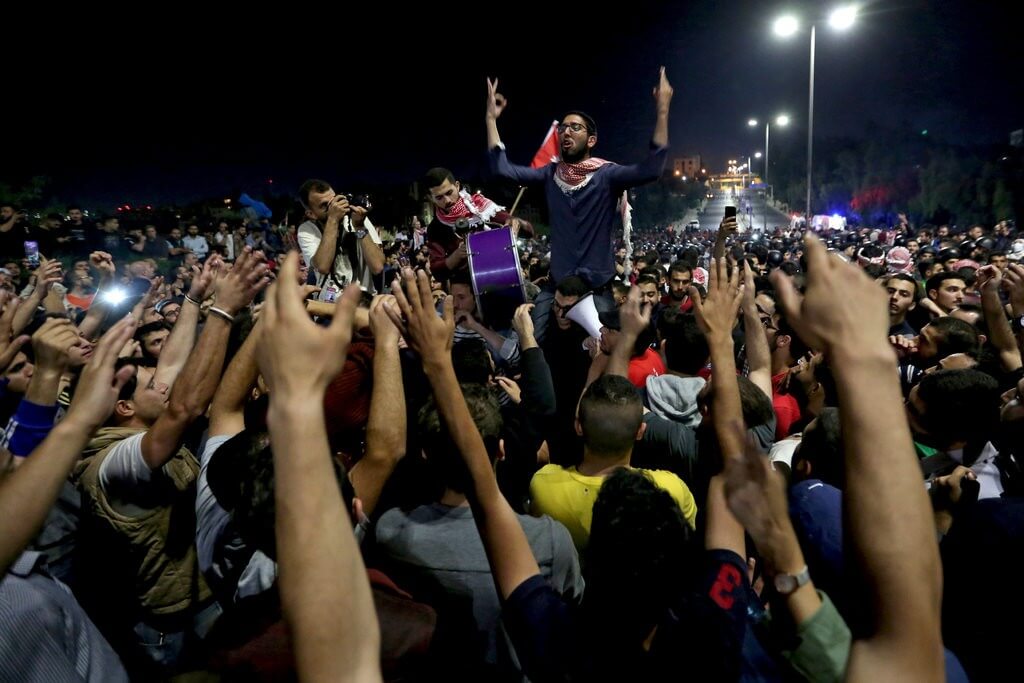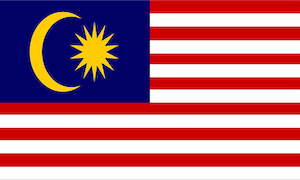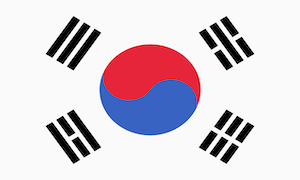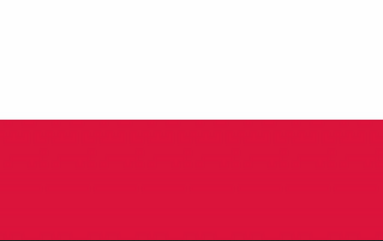June 8, 2018

Photo: Protesters outside the prime minister’s office in Amman, Jordan. Raad Adayleh, Associated Press

Malaysian Central Bank Governor Muhammad Ibrahim officially resigned from his position this week after speculations of a multi-million dollar scandal. The scandal involves the 1MDB, a strategic development company, that has been under investigation since 2015. Ibrahim’s resignation was announced by Prime Minister Mahathir Mohamad on June 6. Ibrahim denies any relation to the scandal, however, claiming “…Bank Negara Malaysia will never be party to any such activities that would betray the public trust in us”. The new administration’s Finance Minister, Lim Guan Eng, has suggested that a land sale made by the recent Prime Minister Najib Razak to the Negara Bank is being used to pay off debts to 1MDB. Bank Negara states that the transaction made with Najib Razak was “fair” and in alignment with “relevant laws.”
Attorney General Tommy Thomas highlighted the importance of the case, stating his number one priority is to “nab the culprits responsible for the 1MDB scandal.” Thomas has announced that his department is requesting help from United States, Switzerland, Luxembourg, and Singapore to ensure that the money involved in the scandal is rightfully returned to Malaysia.

Cambodia’s ruling party announced official plans to monitor and control online content intended to “cause instability” leading up to the July election. Cambodia’s Ministries of Information, Interior, and Posts and Telecommunications will work jointly on “controlling all dissemination of information.” Following a recommendation from the National Electoral Council, the regulation also bans journalists from including personal opinion or bias in their reporting. Violations will be punishable with fines of 5 million to 30 million riels ($1,225 to $7,355 USD). Moreover, the articles written in the notice were “loosely termed,” according to a political analyst in Cambodia, and could be interpreted by the government and courts in such a way as to unjustly charge the authors of content that “leads to the destruction of national defense, security and relationships with other countries, public order, discrimination and culture, and national tradition.” Rights and advocacy groups have decried this notice as a violation of freedom of expression. Phil Robertson, Deputy Asia Director at Human Rights Watch, called the notice “a core part of the pre-election censorship,” and said the new measures were sure to result in the arrest and prosecution of opposition activists and NGO campaigners who “still dare to speak truth to the CPP’s power.”
Opposition leader Kem Sokha was denied bail again in an appeals court as he faces trial for charges of treason, which many view as simply a pretense under the recent crackdown on dissent and government opponents to remove him from politics. This is the fourth time he has been denied bail since his arrest in September 2017.
200 Cambodians in the US, supporting dissolved opposition party CNRP, held a protest over the weekend in front of the Japanese consulate in New York City to demand that Tokyo withdraw aid from the upcoming elections until Prime Minister Hun Sen “reinstates democracy” and allows the CNRP to participate in the election. “Without the CNRP, the election will be a joke,” said Meas Chea, a CNRP activist from Philadelphia.

US Secretary of State Mike Pompeo has called for the Organization of American States to suspend Venezuela for causing a humanitarian crisis and for Maduro’s “dismantling of democracy.” The US has already announced that it will not recognize the results of the May 20 elections. Venezuela had announced plans last year to leave the OAS, claiming that the group infringed on its sovereignty. Following Pompeo’s call, Maduro appeared on Venezuelan TV to denounce the OAS and reiterate that the country is leaving it. Venezuelan Foreign Minister Jorge Arreaza vowed not to submit to the international pressure, saying “no imperialist will intervene in our country and hinder our people from voting for their own authorities and having their own democracy.”
Venezuela freed 40 political prisoners and opponents of Maduro on Saturday, bringing the number of those released to 79. The prisoners were each admonished for their alleged violent crimes against the government and then released in a gesture of goodwill. They were barred from speaking to press or on social media, and from travelling abroad. Politicians Wilmer Azuaje and Gilber Caro, plus Raul Baduel, the son of a dissident former general, were among the prisoners released this weekend. Opposition sources say that around 300 activists remain in jail on charges designed to suppress dissent.
Joshua Holt, the US citizen who was held in Venezuelan prison for nearly two years, met with President Trump and described the deplorable conditions in which he and his wife were held.

Both of the main presidential candidates, conservative Ivan Duque and leftist Gustavo Petro, have asked the Prosecutor General to show evidence supporting his claims of widespread electoral fraud in March’s legislative elections. Their responses come after Prosecutor General Nestor Humberto Martinez stated that he knew of election irregularities but would not release evidence until after the presidential elections are held. Electoral observers have claimed that almost 3% of first-round ballots have been altered.
A recent wave of killings targeting demobilized FARC rebels is threatening the peace process. Former FARC commander Juan Vicente Carvajal was killed near his home in May, as killings of former militants have increased. Their deaths have incited fear and a distrust of the security forces that have been deployed to ensure their protection as part of the peace treaty.
The latest round of peace talks with another guerilla group, the ELN, has been further complicated by insecurity about the implementation of the FARC agreement. Members of the ELN have emphasized that they will only agree to disarmament if their security can be guaranteed and their vision for a fairer society is implemented.
Three community leaders were killed on Saturday as violence against activists continues. The recent uptick in violence comes as the country prepares for contentious presidential elections, with more than 200 activists killed since January 2017, according to the government.
According to the first poll after the first round of the presidential elections, Duque is ahead by 20 points. The second round will occur in two weeks, when Duque faces Petro for the presidency. Both presidential candidates have chosen women as their vice presidential candidates. Marta Lucia Ramirez, the former Minister of Defense and Foreign Trade, is frontrunner Duque’s running mate. She faces Petro’s candidate Angela Maria Robledo, the Director of the Department of Social Welfare in Bogota.
President Santos has finalized the process to become as a “global partner” of NATO, allowing Colombia to take advantage of NATO resources and protocols. It’s status as a partner would not require engagement in NATO’s military operations.

Mexico is responding to the latest round of tariffs from the United States. Their retaliatory tariffs mainly focus on American agricultural products like apples, whiskey, potatoes, and pork. Mexico’s exports to the United States account for more than 80% of total exports, limiting Mexico’s ability to win an all-out trade war. These retaliatory tariffs are mainly targeted to key sectors of President Trump’s support base.
Four years after 43 students went missing in Ayotzinapa, Mexico, a federal court has ruled that a special investigation commission must be created for the case. International organizations and local activists are lauding the move as a step forward in an investigation that has been blocked by the Attorney General’s office.
On Saturday, three female candidates for office were killed across Mexico. Several others including a photographer, a body guard, and a city councilor were found dead along with the candidates. Mexico has seen a surge of political killings, especially of women, as elections on July 1st near.
Mexican businessmen met with presidential frontrunner Andres Manuel Lopez Obrador to discuss development and NAFTA. They agreed to work together to ensure an investment-friendly climate for Mexico after concerns about the left-wing candidate.
On Monday, a peaceful protest in the state of Jalisco turned violent when a group of protestors attacked Navy officers that were surrounding the protest. The violence notably came after recent scrutiny of Mexico’s use of military forces in internal conflicts as a national police force.

The unrest in Nicaragua, initially triggered by cuts to social funding but now in opposition of President Ortega, has resulted in at least 110 killed and many more wounded as demonstrators are met with police repression. Incidents of snipers in the streets were reported and citizens have been warned not to leave their homes. Between Sunday night and Monday morning, another five were added to the death toll. A preliminary investigation by The Inter-American Commission on Human Rights characterized the protests “by the excessive use of force by the security forces of the State and armed third persons.” Some of these third persons are civilian pro-government forces who opened fire last week on a peaceful march to commemorate the lives lost in this conflict. Amnesty International released a statement calling on the Organization of American States to not abandon the Nicaraguan people as they face harsh repression. As protesters erect makeshift medical clinics to treat victims, civilian government supporters have been “taking potshots” at the clinics and attempting to “create panic,” according to one of the protest organizers.
Pope Francis called for end to the violence in an address to thousands at St. Peter’s Square on Sunday. He said the Church is always a proponent of dialogue and that this situation “requires an active commitment to respect freedom and above all life.” In fact, the Nicaraguan Catholic Church had been facilitating peace talks before last week’s violence resulted in serious setbacks, calling the violence “organized and systematic aggression.”
Business leaders in the country are threatening to withhold taxes from the government until it puts an end to the bloodshed in the country.

Bolivian President Evo Morales denounced alleged coup attempts in Venezuela, citing that they violated “principles of sovereignty and non-interference.” Furthermore, Morales framed the Democratic Charter of the OAS as a means for the United States to garner regional support for its interventions. This comes after American Vice President Mike Pence’s request for the OAS to act against Venezuela.
The Bolivian government announced that it would hold talks with the Public University of El Alto (UPEA) to discuss budgetary demands, which sparked protests that escalated in the death of student Jonathan Quispe. Bolivian Presidency Minister Alfredo Rada denounced the protests as “blocking and obstructing … the city of El Alto” and remarked that the demanded resignation of government authorities is inconsistent with the broader requests of the UPEA. Rada also stated that an investigation into Quipse’s death is being conducted.

Last week, the UNHCR and UNDP signed a Memorandum of Understanding with the Myanmar government to initiate the process for ensuring safe and voluntary repatriation of the some 700,000 Rohingya refugees in Bangladesh. The agreement represents a drastic shift from 6 months ago, when the Myanmar government refused to permit the United Nations to assess human rights violations in Rakhine State. Although this represents an “important and necessary” step towards further cooperation between Myanmar and the UN, many remain pessimistic about the creation of favorable conditions for the return of the Rohingya people. The agreement has not been publicly released, and a statement released on Wednesday had no mention of “Rohingya” or a path to citizenship for them. Kyaw Win, the executive director of Burma Human Rights Network, remarked, “It is very politically convenient for the Burmese government to sign this agreement, and also never commit.”
Refugees and activists also continue to express concerns. They believe the 11 settlements designated for the Rohingya people in Myanmar will become “open air prisons.” Rohingya political activist Ko Ko Linn emphasizes that Myanmar’s dedication to repatriation cannot be genuine when Rohingya people in Myanmar continue to face violent and discriminatory acts. Additionally, the Myanmar government still does not consider the Rohingya people to be citizens. Official documents refer to them rather as “Bengalis,” portraying them as illegal immigrants without acknowledging their generational roots in Myanmar. The National Verification Cards, continuously referred to by the government as proof of active repatriation efforts, only register the Rohingya people, without offering citizenship.
Rohingya refugees in Bangladesh continue to face the imminent threat of the upcoming monsoon season, which would devastate makeshift homes and cause widespread mudslides. Bangladesh is ill-equipped to help the refugees prepare for the monsoons. The International Rescue Committee has been trying to set up healthcare units and distribe “tie-down kits” to stabilize makeshift homes. IRC President David Miliband expressed his frustrations with politics: “humanitarian aid can staunch the dying but it takes politics to stop the killing.”
Chinese conglomerate Citic Group has been leading the construction of a deep water port in Rakhine State. This port is part of China’s Belt and Road Initiative that would give China direct access to the Indian Ocean without having to go through the Malacca Straits. However, the enormous cost of this project at $9 Billion has pressured Aung San Suu Kyi’s government to reevaluate. If the financial costs of this project proves too burdensome and Myanmar defaults on its debt, the port will come under Beijing’s control and threaten Myanmar’s economic sovereignty. Therefore, officials are trying to negotiate the costs down. This situation is uncannily similar to Sri Lanka’s in December of last year. The government was unable to pay its debts to state-backed Chinese firms and formally handing over the port of Hambantota to China. Chinese investments in Malaysia have also induced concerns about the economic power balances in Southeast Asia among Malaysian politicians.


On June 1st, President Trump hosted North Korean General Kim Yong Chol at the White House. After a 90-minute meeting, it was announced that the June 12th summit in Singapore is reinstated. The meeting, however, did not include US National Security Adviser John Bolton, who had mentioned on a televised interview that the Trump Administration would take a Libya-style approach to North Korean denuclearization. The Libya model refers to the 2003 deal with Muammar Gaddafi to exchange Libya’s weapons of mass destruction for the easing of sanctions. He was eventually killed by US-backed Libyan rebels. Therefore, this reference understandably threatened the June 12 summit. Kim Jong Un’s approach to the Singapore summit represents a notable shift away from the political priorities of Kim Jong Il and Kim Il Sung, who emphasized nuclear development.
Despite the reinstatement of the summit, there remain significant differences between North Korea and the United States’ approach to the possible denuclearization deal. The United States is calling for a “complete, verifiable and irreversible denuclearization” of the peninsula, which may entail prohibiting missile and nuclear testing, limiting North Korea’s supply of fissile material, and closing the Yongbyon nuclear plant.
North Korea’s three neighboring countries have notably high stakes in the Singapore summit. Shinzo Abe of Japan is prioritizing the destruction of long and short-range missiles and reckoning over Japanese abductees. On the other hand, Xi Jinping of China has been supportive of the direct talks between the United States and North Korea, but there is an implicit anxiety that it would negatively affect the diplomatic leverage that China has over North Korea. Furthermore, Xi is interested in managing, as opposed to eliminating, North Korea’s nuclear program. In sharp contrast, South Korea’s Moon Jae-in is the most avid champion of the upcoming talks, since his long-held personal and political priority has been to end the Korean War and ensure peace on the Korean Peninsula.

Prime Minister Prayut Chan-o-cha reaffirmed his commitment to enforce his political activities ban, which strictly limits the ability of opposition parties to campaign and recruit candidates. This move effectively ensures that upcoming elections, tentatively scheduled for February, will not be free and fair, since opposition parties will not be able to organize under the same mechanisms as the ruling party. The National Council for Peace and Order has shown a weak commitment to fully repealing the rule, despite statements requesting negotiations over rule modifications before the elections.
A controversial thirty billion baht satellite program is up in the air after Prime Minister Chan-o-cha described it as a work in progress. The program drew outrage this week due to its costs. A Defense Ministry source later described the program as an early-stage proposal that requires multinational support and debate within the cabinet.

The United Nations report on the criticism of Polish judiciary has been called a “cynical political game” by Deputy Minister of Justice Marcin Warchol. He called the report a “mockery of human rights” as he advocated that the law in Poland ensures a democratically-elected parliament, and that greater parliamentary control of the judiciary makes for a more democratic and accountable system.
There are continued protests by students and employees of the University of Warsaw against Act 2.0 -being deliberated by parliament- calling for more democratic universities. The organizers of the protests have a set of 11 demands regarding university reform.
The motion to censure against Deputy Prime Minister Beata Syzdlo, the minister who instituted judiciary reform and is under scrutiny for her social welfare schemes, has been rejected and Prime Minister Mateusz Morawieki has strongly come out in her support.

On June 3rd, an Iranian senior military official stated that Iran would not remove its military advisers from Syria. Iran’s presence- unlike that of other military forces, was requested by Damascus. General Massoud Jazayeri, spokesman of the Iranian Armed Forces, stated “Iran and Syria enjoy deep relations that would not be influenced by the propaganda of anyone.” Nevertheless, due to tensions between Israel and Iran, the US and Israel are pursuing efforts to push Iranian forces out of Syria. Israeli Prime Minister Benjamin Netanyahu- threatened to conduct- military strikes on Syria, targeting the posts of Iranian militias and Hezbollah, if Iran does not remove its forces from Syria.
Furthermore, Russia has made an agreement with Israel regarding Iran’s military presence in Syria. Russian Foreign Minister Sergei Lavrov announced “all the forces that are not Syrian should withdraw, and there must be a situation in which only the forces of the Syrian army will be stationed on the Syrian side of the border with Israel.” As Syria’s biggest ally, Russia is eager to use its influence to ensure the stability of Bashar al-Assad’s regime.

The Trump administration has delivered a blow to its closest allies-the EU, Canada, and Mexico– by introducing tariffs on metals, citing national security concerns, and leading to immediate vows of retaliation. With Canadian Prime Minister Trudeau’s failure of a “Maple syrup strategy”, even the closest and the most conciliatory of Trump allies, including French President Macron, are moving further from Trump. Correspondingly, Wall Street has slumped as the Dow Jones Industrial Average closed down more than 250 points on the 31st of May, as investors sold off shares in manufactures and corporations affected by the tariffs. The 44th G7 meeting is underway in Quebec, Canada, and as a consequent of these recent decisions,, Trump is likely to face a chilly response.
In defiance of the United States’ withdrawal from the Iran Nuclear Deal, the European Union is seeking to shield EU companies doing business with Iran and recover damages caused due by US sanctions. Germany, France, and the United Kingdom have sent a letter to Secretary of State Mike Pompeo in a last-ditch effort to negotiate, requesting not to punish EU companies in Iran.

Opposition supporters marched through Harare on Tuesday to call for a free and fair presidential election on June 30th. President Mnangagwa, appointed after the removal of Robert Mugabe, has invited international observers for the upcoming elections. Opposition peaceful protests also included delivering petitions to the presidential office and the electoral commission. Protesters were energized by opposition candidate Nelson Chamisa, the head of the MDC-T party.
The following day, a small group of supporters of the ruling ZANU-PF party marched in Harare in response. Both protests were observed by police without interference.
Chamisa promised on Friday to generate a $100 billion economy within a decade, as part of his new election manifesto. He also affirmed his commitment to re-establish ties with Israel, despite a strong existing relationship with Palestine.
Maldives – After police interference in the MDP opposition primary that chose Nasheed as its presidential candidate, a group of western nations, including the European Union, have urged the country to hold a “credible, transparent presidential poll.” – Reuters
Armenia – Newly appointed Prime Minister Nikol Pashinyan said that Armenia should hold elections within a year. – Reuters
Jordan – Jordan’s Prime Minister resigned on Tuesday after mounting peaceful protests over a bill that would increase taxes on the working and middle classes. His replacement, Omar Razzaz, has said he will reverse action on the bill after the formation of a government. – Washington Post
Democratic Republic of Congo: Experimental Ebola treatments have been approved by the DRC amidst the growing number of people affected by the Ebola virus in the country. These treatments could bring a major change in the world’s response to Ebola, and responses to this outbreak could help lead a treatment for future generations-Wall Street Journal
CANVAS News
Death of Palestinian Medic Sparks Outrage and Investigations
The death of a medic in Gaza has prompted outcry and an investigation by Israeli officials. She was shot by Israeli Security forces as she approached the Gaza border fence. Her death comes as hundreds of Palestinian protesters have been killed by the Israeli military near the border in a recent protests.